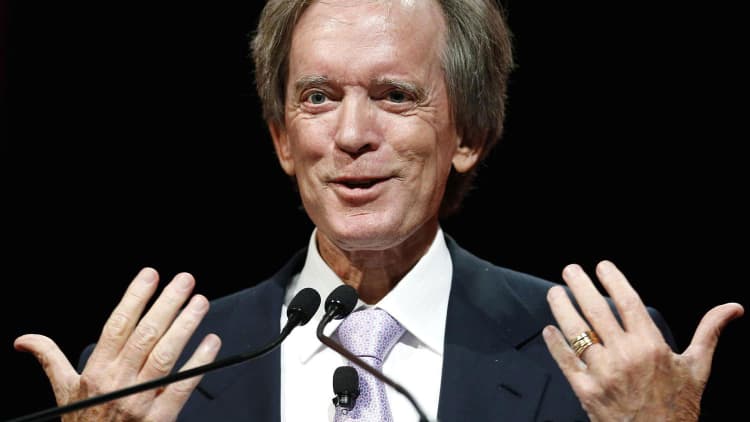
Central banks are stuck in a permanent cycle of low interest rates and money printing that bond guru Bill Gross said eventually will blow up.
In his monthly newsletter for clients, the Janus Capital portfolio manager again railed against policies from the Federal Reserve and its counterparts around the world that he said have inflated asset prices but have done little to boost economic growth.
He likened the easy-money efforts to "financial methadone," in which the Fed's withdrawal of stimulus has been met with increased efforts from the European Central Bank, the Bank of Japan and elsewhere.
The global central bank balance sheet has surpassed $12 trillion, Gross said. At the same time, Fitch Ratings recently reported that global sovereign debt with negative yields still surpasses $9 trillion.
All of it has created a perilous situation, Gross said.
"Quantitative easing will continue even though the dose may be reduced in future years," he wrote. "But while a methadone habit is far better than a heroin fix, it has created and will continue to create an unhealthy capitalistic equilibrium that one day must be reckoned with."
Complaints about the trade-offs in central bank policies are not new. Many in the financial community have bemoaned how stock market prices have soared and bond yields have stayed low, all while real growth in the U.S. and most other developed economies remains below historical norms.
The debate, though, has a new wrinkle now that the Fed is trying to normalize policy and Washington is now abuzz with talk of fiscal stimulus that would provide a handoff from the Fed's ultra-easy policy that has persisted since the financial crisis.
However, Gross remains suspicious that much will change regarding central banks.
"In order to control volatility, and keep a floor under asset prices, central bankers may be trapped in a QE-forever cycle, (in order to keep the global system functioning)," he wrote. "Withdrawal of stimulus, as has happened with the Fed in the past few years, seemingly must be replaced by an increased flow of asset purchases (bonds and stocks) from other central banks."
"A $12 trillion global central bank balance sheet is PERMANENT — and growing at over $1 trillion a year, thanks to the ECB and the BOJ," Gross added.
Should the Fed's counteparts not keep buying U.S. government debt and hold interest rates low, the yield on the benchmark 10-year note would jump to 3.5 percent "and the U.S. economy would sink into recession," he predicted.
Still, Gross said investors more or less just need to go with the flow, even as central bank policies penalize savers and pensioners who suffer under the low yields.
For his part, Gross has done fairly well managing his $1.8 billion Janus Global Unconstrained Bond Fund. The fund, which blends strategies, is up 5.46 percent over the past 12 months, putting it well ahead of the Bloomberg Barclays U.S. Aggregate Bond index return of 1.16 percent though behind the general average of other similar funds, according to Morningstar.
He believes central banks will keep piling in money, thus keeping the "financial methadone" cycle working — until it doesn't anymore.
"An investor must know that it is this money that now keeps the system functioning," he wrote. "Without it, even 0 percent policy rates are like methadone — cancelling the craving but not overcoming the addiction.


